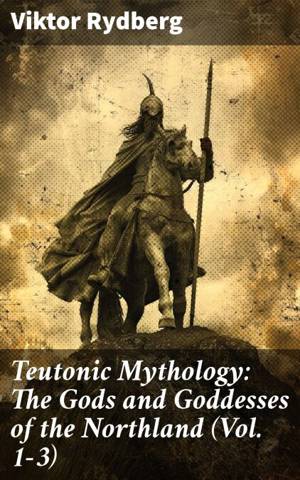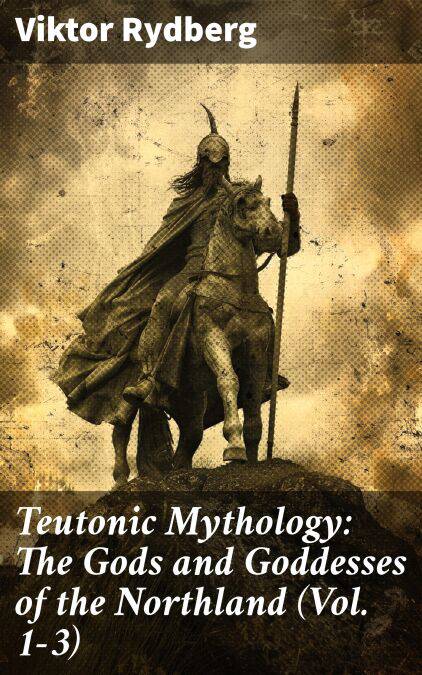
- Afhalen na 1 uur in een winkel met voorraad
- Gratis thuislevering in België vanaf € 30
- Ruim aanbod met 7 miljoen producten
- Afhalen na 1 uur in een winkel met voorraad
- Gratis thuislevering in België vanaf € 30
- Ruim aanbod met 7 miljoen producten
Zoeken
Teutonic Mythology: The Gods and Goddesses of the Northland (Vol. 1-3) E-BOOK
Enriched edition. Complete Edition
Viktor Rydberg
E-book | Engels
€ 1,99
+ 1 punten
Omschrijving
In "Teutonic Mythology: The Gods and Goddesses of the Northland" (Volumes 1-3), Viktor Rydberg delves deeply into the rich tapestry of Norse mythology, exploring the intricate narratives and profound symbolism of its deities, heroes, and cosmological beliefs. Rydberg employs a meticulous and scholarly literary style, weaving together historical analysis, comparative mythology, and poetic interpretation to illuminate the significance of these figures within the broader context of Germanic and Teutonic folklore. Each volume serves as a comprehensive examination of mythological themes, illustrating the enduring impact of these ancient stories on cultural identity and heritage in Northern Europe. Viktor Rydberg, a prominent Swedish poet and scholar of the 19th century, was profoundly influenced by the Romantic movement and the burgeoning interest in folklore and mythology during his era. His background in linguistics and literature, combined with a passionate admiration for his Scandinavian roots, propelled him to investigate and document the mythological heritage of the North. Rydberg's scholarly pursuits are not merely academic; they reflect a deep-seated desire to reclaim and celebrate the cultural narratives that shaped his nation and its identity. This monumental work is highly recommended for scholars, students, and enthusiasts of mythology, as it offers an exhaustive exploration of Teutonic traditions. Rydberg's insightful analysis not only enriches our understanding of Norse mythology but also encourages contemporary readers to reconnect with the ageless themes that resonate across time and culture.
In this enriched edition, we have carefully created added value for your reading experience:
- A succinct Introduction situates the work's timeless appeal and themes.
- The Synopsis outlines the central plot, highlighting key developments without spoiling critical twists.
- A detailed Historical Context immerses you in the era's events and influences that shaped the writing.
- A thorough Analysis dissects symbols, motifs, and character arcs to unearth underlying meanings.
- Reflection questions prompt you to engage personally with the work's messages, connecting them to modern life.
- Hand‐picked Memorable Quotes shine a spotlight on moments of literary brilliance.
- Interactive footnotes clarify unusual references, historical allusions, and archaic phrases for an effortless, more informed read.
In this enriched edition, we have carefully created added value for your reading experience:
- A succinct Introduction situates the work's timeless appeal and themes.
- The Synopsis outlines the central plot, highlighting key developments without spoiling critical twists.
- A detailed Historical Context immerses you in the era's events and influences that shaped the writing.
- A thorough Analysis dissects symbols, motifs, and character arcs to unearth underlying meanings.
- Reflection questions prompt you to engage personally with the work's messages, connecting them to modern life.
- Hand‐picked Memorable Quotes shine a spotlight on moments of literary brilliance.
- Interactive footnotes clarify unusual references, historical allusions, and archaic phrases for an effortless, more informed read.
Specificaties
Betrokkenen
- Auteur(s):
- Uitgeverij:
Inhoud
- Aantal bladzijden:
- 716
- Taal:
- Engels
Eigenschappen
- Productcode (EAN):
- 8596547776376
- Verschijningsdatum:
- 12/12/2023
- Uitvoering:
- E-book
- Beveiligd met:
- Digital watermarking
- Formaat:
- ePub

Alleen bij Standaard Boekhandel
+ 1 punten op je klantenkaart van Standaard Boekhandel
Beoordelingen
We publiceren alleen reviews die voldoen aan de voorwaarden voor reviews. Bekijk onze voorwaarden voor reviews.








